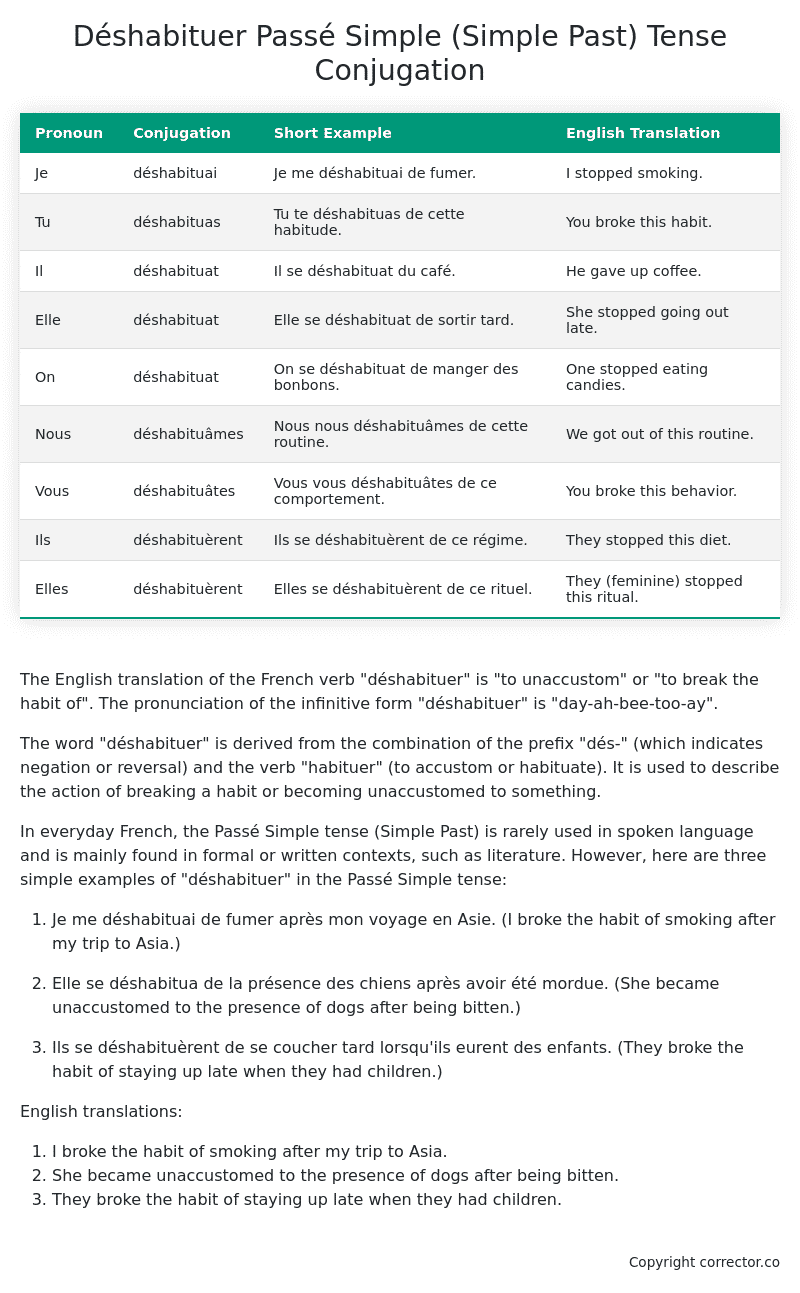Passé Simple (Simple Past) Tense Conjugation of the French Verb déshabituer
Introduction to the verb déshabituer
The English translation of the French verb “déshabituer” is “to unaccustom” or “to break the habit of”. The pronunciation of the infinitive form “déshabituer” is “day-ah-bee-too-ay”.
The word “déshabituer” is derived from the combination of the prefix “dés-” (which indicates negation or reversal) and the verb “habituer” (to accustom or habituate). It is used to describe the action of breaking a habit or becoming unaccustomed to something.
In everyday French, the Passé Simple tense (Simple Past) is rarely used in spoken language and is mainly found in formal or written contexts, such as literature. However, here are three simple examples of “déshabituer” in the Passé Simple tense:
-
Je me déshabituai de fumer après mon voyage en Asie.
(I broke the habit of smoking after my trip to Asia.) -
Elle se déshabitua de la présence des chiens après avoir été mordue.
(She became unaccustomed to the presence of dogs after being bitten.) -
Ils se déshabituèrent de se coucher tard lorsqu’ils eurent des enfants.
(They broke the habit of staying up late when they had children.)
English translations:
- I broke the habit of smoking after my trip to Asia.
- She became unaccustomed to the presence of dogs after being bitten.
- They broke the habit of staying up late when they had children.
Table of the Passé Simple (Simple Past) Tense Conjugation of déshabituer
| Pronoun | Conjugation | Short Example | English Translation |
|---|---|---|---|
| Je | déshabituai | Je me déshabituai de fumer. | I stopped smoking. |
| Tu | déshabituas | Tu te déshabituas de cette habitude. | You broke this habit. |
| Il | déshabituat | Il se déshabituat du café. | He gave up coffee. |
| Elle | déshabituat | Elle se déshabituat de sortir tard. | She stopped going out late. |
| On | déshabituat | On se déshabituat de manger des bonbons. | One stopped eating candies. |
| Nous | déshabituâmes | Nous nous déshabituâmes de cette routine. | We got out of this routine. |
| Vous | déshabituâtes | Vous vous déshabituâtes de ce comportement. | You broke this behavior. |
| Ils | déshabituèrent | Ils se déshabituèrent de ce régime. | They stopped this diet. |
| Elles | déshabituèrent | Elles se déshabituèrent de ce rituel. | They (feminine) stopped this ritual. |
Other Conjugations for Déshabituer.
Le Present (Present Tense) Conjugation of the French Verb déshabituer
Imparfait (Imperfect) Tense Conjugation of the French Verb déshabituer
Passé Simple (Simple Past) Tense Conjugation of the French Verb déshabituer (You’re reading it right now!)
Passé Composé (Present Perfect) Tense Conjugation of the French Verb déshabituer
Futur Simple (Simple Future) Tense Conjugation of the French Verb déshabituer
Futur Proche (Near Future) Tense Conjugation of the French Verb déshabituer
Plus-que-parfait (Pluperfect) Tense Conjugation of the French Verb déshabituer
Passé Antérieur (Past Anterior) Tense Conjugation of the French Verb déshabituer
Futur Antérieur (Future Anterior) Tense Conjugation of the French Verb déshabituer
Subjonctif Présent (Subjunctive Present) Tense Conjugation of the French Verb déshabituer
Subjonctif Passé (Subjunctive Past) Tense Conjugation of the French Verb déshabituer
Subjonctif Imparfait (Subjunctive Imperfect) Tense Conjugation of the French Verb déshabituer
Conditionnel Présent (Conditional Present) Tense Conjugation of the French Verb déshabituer
Conditionnel Passé (Conditional Past) Tense Conjugation of the French Verb déshabituer
Conditionnel Passé II (Conditional Past II) Tense Conjugation of the French Verb déshabituer
L’impératif Présent (Imperative Present) Tense Conjugation of the French Verb déshabituer
L’impératif Passé (Imperative Past) Tense Conjugation of the French Verb déshabituer
L’infinitif Présent (Infinitive Present) Tense Conjugation of the French Verb déshabituer
L’infinitif Passé (Infinitive Past) Tense Conjugation of the French Verb déshabituer
Le Participe Présent (Present Participle) Tense Conjugation of the French Verb déshabituer
Le Participe Passé (Past Participle) Tense Conjugation of the French Verb déshabituer
Struggling with French verbs or the language in general? Why not use our free French Grammar Checker – no registration required!
Get a FREE Download Study Sheet of this Conjugation 🔥
Simply right click the image below, click “save image” and get your free reference for the déshabituer Passé Simple tense conjugation!

Déshabituer – About the French Passé Simple (Simple Past) Tense
Formation
Usage
Narration
Historical Context
Interactions with other tenses
Passé Composé
Imparfait
Conditional and Subjunctive
Summary
I hope you enjoyed this article on the verb déshabituer. Still in a learning mood? Check out another TOTALLY random French verb conjugation!


